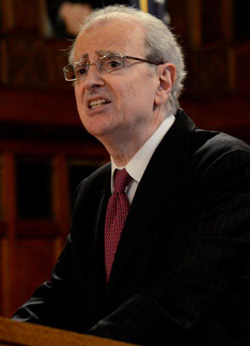Task force hears call for strong measures for legal services
By Rex Bossert
Staff Writer
Addressing the severe shortage of legal services for the
poor requires strong measures such as pro bono requirements for lawyers and new
kinds of legal service providers, according to New York and Washington state officials.
 |
Judge Jonathan Lippman – Photo courtesy of New York State Office of Court Administration
|
Jonathan Lippman, chief judge of the State of New York, told
a State Bar task force on May 28 that his state’s judiciary has taken the lead
in establishing innovative ways to increase legal aid for poor and low-income
people who can’t afford a lawyer.
“Legal services for the poor is not tangential to what we
do, it is what we do,” Lippman said to the Civil Justice Strategies Task Force.
Speaking by webcast, Lippman described several programs
created in New York to help poor and working-class families. These include
implementing a 50-hour pro bono requirement for members of the New York bar, increasing
state funding for legal service providers, allowing law students to take the
bar exam early and authorizing a new category of legal “navigators” to help
low-income people with housing, consumer credit and other issues.
New York and California are among the first states to require lawyers to perform pro bono work, Lippman
said. He said law students and young lawyers especially have embraced the 50-hour
requirement because they are entering the profession to help others. He added that
if New York and California provide the example, “the rest of the country will
follow.”
Lippman also said that over the past few years, the New York
Legislature has increased the judiciary’s budget for grants to legal service
providers from $27.5 million to $70 million. Economics experts have shown that
for every dollar spent for legal services for the poor in New York, $6 has been
returned to the state’s economy, he said.
“It’s good for the bottom line of our state for its
financial well-being and heath,” Lippman said.
Starting next year, Lippman said, third-year law students
will be able to take the New York bar exam in February and spend the rest of
the year providing legal services in clinical programs supervised by law
schools.
Drawing much attention from task force members was New York’s
unique legal navigators program, which allows specially trained counselors to
accompany unrepresented clients to court for advice and moral support on simple
matters such as consumer credit disputes.
Lippman said the program is “going very well” after the
judiciary established administrative rules and training for both the navigators
and the judges in whose courts they appear. He also addressed possible
objections by lawyers to the potential for increased competition from non-lawyers.
“We’re not taking bread out of anyone’s mouths,” Lippman
said.
While New York court officials pursued a strategy of
establishing the navigator practice first, then developing the regulatory framework
that will soon govern it, Washington state officials first spent years crafting
rules for legal service technicians and are now implementing a two-year training
program.
Stephen Crossland, a solo practitioner and former Washington
state bar president, described to the task force the creation of the state’s Limited
License Legal Technician program, which will issue its first licenses next
year.
Authorized by the Washington Supreme Court, the legal
technicians will receive training at three state law schools and 29 community
colleges to provide counseling for people with family law issues who cannot
afford a lawyer.
Unlike their New York counterparts, Washington’s legal
technicians will help clients prepare their paperwork and cases, but will not
go to court. Crossland said officials eventually hope to broaden the program to
focus on landlord-tenant, elder and immigration law.
Eighteen months ago, Crossland said, a 13-member board reporting
to the Supreme Court was established to create an exam and oversee licensing, discipline
and continuing education of legal technicians.
“It’s a whole new bar association,” said Crossland, who
serves as the board’s chief.
Also speaking to the task force was Veyom Bahl of the
anti-poverty organization Robin Hood, who described his group’s funding of the
new Immigrant Justice Corps. Modeled after the Peace Corps, the Immigrant
Justice Corps will provide fellowships for recent college and law school
graduates to work with nonprofit groups to help low-income people with
immigration issues.
Margaret Hagen, a student fellow at Stanford Law School’s
Center for Internet and Society, told the task force about new online
strategies to provide low-cost legal services with input from the consumers
themselves.
Colin Rule, founder and Chief Operating Officer of Modria, a
new online dispute resolution firm, described to the task force how his
company’s Internet-based technology grew out of efforts to handle millions of
low-value consumer disputes for eBay and PayPal.
The next meeting of the task force is scheduled for June 18
in Los Angeles and will focus on the high cost of legal education. For more
information, see the
task force web page.
The
State Bar’s Task Force on Admissions Regulation Reform Phase II, charged
with implementing new training requirements for lawyers that would include 50
hours of pro bono, meets June 11 in San Francisco.